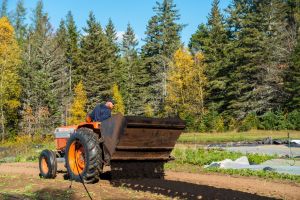USDA Grant to Provide Growers with Thousands in Financial Assistance for Compost Application
Print this Article | Send to Colleague
The USCC and Zero Foodprint are collaborating to provide growers with financial support to use compost in their operations. This project is supported and funded by the U.S. Department of Agriculture through a Natural Resources Conservation Service (NRCS) Conservation Innovation Grant (CIG). The research project, titled Comparative and Ongoing Compost Application Trials to Guide and Incentivize Best Use Amid New Compost Production Laws, includes $4.4 million distributed over 5 years. The USCC and grant partners will be able to provide up to $10,500 in assistance to growers looking to apply compost to their orchard, cropland, or rangeland. Funding can be used to help growers cover the cost of compost purchase, delivery, application, and technical assistance.
The growers that receive this grant will allow a USCC-organized team of leading researchers and project implementation partners to closely monitor the impacts of the applied compost on their soil health and carbon sequestration rates. The team will conduct over 80 new soil health demonstration (SHD) trials of compost application in varied production systems; integrate and extend research from 13 ongoing SHD trials of compost application; and synthesize the results into a decision support tool and best management practice guides. The comparative trials will assess environmental, economic, and social benefits to compost application across various soil types, compost types/rates, and production systems in three states: California, Colorado, and Washington.
The USDA Grant will ultimately help continue developing agricultural markets for compost, benefitting both compost manufacturers and growers. The knowledge gleaned from this research will aid the implementation of the NRCS Conservation Practice Standard 336, whose purpose is to increase soil carbon by applying soil amendments like compost. Using the robust data generated by this study, our research team will develop a series of best practices guides for compost application in row crop, orchard, and rangeland systems. These guides will be provided to NRCS to help continue to integrate compost application into conservation programs and reduce barriers for growers looking to use compost as an effective management tool. The results of this project will benefit growers and our food system long into the future by building healthier soils and a more resilient environment.
If you are a grower interested in applying for this opportunity—or if you are a Seal of Testing Assurance (STA) compost manufacturer connected to growers who may be interested—please reach out to sdixon@compostingcouncil.org


